Palestinians’ Hard Choice: An Interview With Sari Nusseibeh
Palestinian intellectual, political figure and former PLO official Sari Nusseibeh (above) talks with Jon Wiener, historian and contributor to The Nation, about Nusseibeh's new memoir, future prospects for peace between Israelis and Palestinians, and the 2006 July War in Lebanon -- a war, he says, that "both sides lost."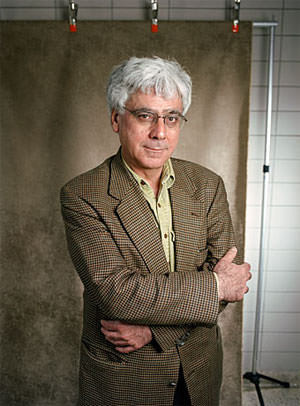
Sari Nusseibeh [right], a leading Palestinian intellectual and political figure, is a long-time advocate of a two-state solution and was the PLO’s chief representative in Jerusalem in 2001 and 2002. He is now president of Al Quds University, the only Arab university in Jerusalem. His memoir, “Once Upon a Country: A Palestinian Life,” was published in April by Farrar, Straus and Giroux. I spoke with Nusseibeh April 30 in Los Angeles.
Jon Wiener: What did the 2006 July War in Lebanon look like to you in Jerusalem?
Sari Nusseibeh: It was totally crazy, an example of how wars can sometimes be totally useless. In that war, the stated objective was to recover two Israeli soldiers who had been kidnapped by the other side, and today those two soldiers are still in custody. The entire Lebanese people paid a very high price in the destruction and devastation of their country and their capital, and for nothing.
Wiener: The Israelis did not win this war. Would you say Hezbollah won the war?
Nusseibeh: Hezbollah does say it won the war, but I would say both sides lost. Because you have to look not only at the political party or leadership that’s carrying out the war; you have to look beyond that at the country itself and the people themselves. And if you look at the people of Lebanon, I believe the war has pushed them back generations. Destroyed their lives and livelihoods, their infrastructure. I think it’s a war where two sides have lost.
Wiener: What effect did the July War have on Palestinians? I’ve heard that the most popular figure among Palestinians is the head of Hezbollah, Hassan Nasrallah. Is that true?
Nusseibeh: At the time the war was on, that was true. Every time he came out on the TV screens he was always smiling and talking gently and always escaping the attempts by the Israeli army to take him out. Every time the Israelis said they had managed to kill him, he would appear a day or two later. So he really captured the hearts of the Palestinians and perhaps of the Arabs more generally — as a beaten people, as a people who have been constantly beaten in wars. He personified for them the ability to stand up to Israeli military might. But perhaps since then things have changed.
Wiener: The Israelis say “our soldiers were kidnapped by terrorists who crossed a recognized international boundary, 3,000 rockets were fired at our civilians, hundreds of thousands of our civilians were driven from their homes into shelters, what were we supposed to do? Of course we had to respond.”
Nusseibeh: You are describing events during the war, but those have to be separated from what happened at the beginning. What happened at the beginning was two Israeli soldiers were taken prisoner by Hezbollah. The very first step was Israel’s insistence that it should go to war to retrieve the two prisoners. That was the first mistake. Then other mistakes followed. Clearly they were not prepared for and did not expect such intensive opposition and resistance from the other side. It was totally unexpected.
Wiener: Some analysts say we have to see that war as a proxy war between the U.S. and Iran. Do you agree?
Nusseibeh: It was a proxy war between people who take positions very hastily and think they can quickly destroy the other side, not giving any respect for how strong they might be.
Wiener: Your book “Once Upon a Country” ends with the elections to the Palestinian Legislative Council in early 2006, that shocking moment when Hamas won a lot more seats than Fatah. The Israeli right argued that this election proved peace with the Palestinians was impossible. What’s your understanding of the outcome of those elections?
Nusseibeh: That argument is very far from reality, in my opinion. We know for example that these elections took place a year after the presidential elections following the death of Arafat. In those elections, Abu Mazen was elected by a majority of the Palestinians. Everybody, including the Palestinians, assumed that this vote was a vote for peace. Abu Mazen, even in the time of Arafat, was the man of peace, the man who embodied the Oslo process. But a whole year passed with Abu Mazen as president when the people who elected him did not see any tangible progress towards peace. So there was a lot of frustration. That’s the first point you need to understand.
Second is that when the elections were finally held and Hamas won, there was a problem with the people in Fatah who did not get together. They did not run as a single party. That wasted votes. That was another reason why Hamas won. If you added up the votes of all the different Fatah people who ran, I think you would find Hamas did not win a majority,
Wiener: If we are listing the missed opportunities, certainly the Israeli failure following death of Arafat was one. There is also the Israeli pullout from Gaza. It seemed at one point that that might be the prelude to a broad pullout from the West Bank. That didn’t happen. The Israelis blamed the Palestinian Authority for failing to disarm terrorist groups in Gaza, which has remained a base for attacks on southern Israel. What went wrong with the Gaza pullout?
Nusseibeh: We have to go back to the beginning — and look not just at what happened after the Israeli pullout. At the time, [Ariel] Sharon himself argued that this unilateral pullout was a step toward ending the occupation throughout the territories. But Palestinians argued at the time that the unilateral nature of this pullout would enable some groups to claim that the Israelis were leaving only because of the rockets and the fighting on the Hamas side. What was required at the time was a mutual agreement between the Israelis and the Palestinians.
As soon as the Israelis withdrew, the Hamas people in Gaza declared military victory, the same way Hezbollah declared military victory when Israel withdrew from southern Lebanon. They said “we pushed them out with our guns, and this shows we should go on fighting on the West Bank.” What happened was the growing strength for the military wing in Gaza, leading to the situation we find today. The moral, I believe, is that any step toward peace in the region must be mutual, must be reciprocal, must be agreed upon by the two sides. You cannot make peace unilaterally, the way you can make war unilaterally. You can only make peace bilaterally.
Wiener: In your book “Once Upon a Country” your account of the 1948 war is different from the prevailing history in Israel and the U.S. Our understanding here is that six Arab armies attacked the new state of Israel after it declared independence in 1948. The neighboring Arab states rejected a U.N. partition plan that would have created a Palestinian state alongside Israel. You don’t mention this invasion in your book.
Nusseibeh: The fact is that these armies attacked. The question is, what was the reason? Why did they attack? Was it that they attacked because they rejected the partition plan, or because some or most of them wanted to grab as much territory as possible, given the fact of the partition plan? One Israeli historian, Benny Morris, claims that the Arab armies went in mostly in a land grab, to get as much land for themselves as possible. I’m not sure, but it seems that people assumed Israel was going to have part of this land, and the question on the part of the Arab governments was whether this land was going to be given to the Palestinians to establish their own state, or whether we should step in and appropriate the land for ourselves. This was primarily the motivation for their entry into the country at that time.
Certainly the Palestinians rejected the partition plan. There is no doubt that they were very angry at the partition plan and did not wish for Israel to be created at the time. It took them a long time until they came around to seeing that they had to accept this partition plan, and that perhaps the future can be better for themselves if a peace is worked out with the Israelis.
Wiener: The biggest obstacle in any peace settlement, according to the Israelis, is the Palestinian claim of a right of return. In 1948 your mother’s family was expelled from land that had been theirs for generations. What do you tell your Palestinian comrades about the right of return?
Nusseibeh: This is the most painful part of a compromise that has to be made between Israelis and Palestinians. We have to think not only of the past but also of the future. I’ve been accused of arguing that we don’t have a right of return. That is false. I think we have a right of return. But we have other rights as well. We have a right to freedom. We have a right to independence. We have a right to create a new future. And very often in life the implementation of one right conflicts with the ability to implement another. You have to make a choice. In this case, I’ve been arguing with my peers, my colleagues, my people, that we must choose, and that, morally speaking, the best choice is to opt for the right to freedom, the right to independence, and the right to a new future.
Wiener: You were an important figure in the first intifada, 1987-1991, which relied on massive civil disobedience. The second intifada began in 2000 after Sharon’s provocative visit to the Temple Mount — that is the intifada of the suicide bombers. How do you explain the difference between the two?
Nusseibeh: The first intifada was an explosion of frustration. The challenge at the time was, can we turn this explosion into something with a political objective? There were three elements that helped into making that explosion into a political act. One was the existence of leadership. We had that — it was called the Unified Leadership of the Uprising. Second, it had a vision — the vision was, we want to lead all of this movement toward negotiations with Israel to create a Palestinian state with East Jerusalem as its capital. Third, that intifada also had a day-by-day, month-by-month strategy to bring us to that conclusion. That strategy was primarily civil disobedience, and that is primarily how I was involved in the intifada. We succeeded in the sense that we finally were able to bring the two peoples closer to realizing that two-state solution was the only feasible solution, and indeed we got negotiations between the two parties.
With this latter explosion of violence, which began in 2000, I refuse to call this an intifada, because it had neither a leadership, nor a vision, nor a plan. It was simply — in my opinion — a crazy expression of frustration and anger, totally useless, chaotic and certainly counterproductive, involving acts of violence and of terrorism that only brought ruin to the Palestinian people and to our achievements.
Wiener: Does the recent electoral success of Hamas make you worried that you might have to live in an Islamic fundamentalist state? What do you see as the future of Islamic fundamentalism among the Palestinians?
Nusseibeh: There are two parts to this question. The first part concerns what kind of state I would wish to live in. When I have resisted occupation, calling for an independent Palestinian state, I really need a state that will respect my rights as an individual. Will respect my freedoms, will be a lawful state where there’s equality, freedom of opinion. I do not believe a rigid Islamic fundamentalist state would provide me with this, so it’s not the state that I have fought for, and certainly not the one I would want to live in.
But behind the fundamentalism, behind Hamas and its ideology, are the people, and it’s easy to reach out to the people. You can never change the ideology itself. The question is how big or small it is going to be in the general landscape. I think it can be limited by reaching out to people, providing them with hope, with progress, with the ability to provide a better life for themselves and their families in the future.
Your support matters…Independent journalism is under threat and overshadowed by heavily funded mainstream media.
You can help level the playing field. Become a member.
Your tax-deductible contribution keeps us digging beneath the headlines to give you thought-provoking, investigative reporting and analysis that unearths what's really happening- without compromise.
Give today to support our courageous, independent journalists.

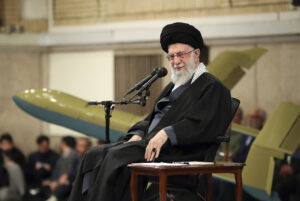
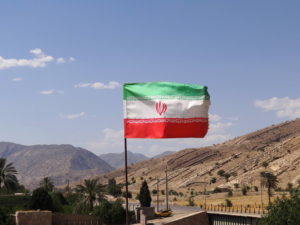
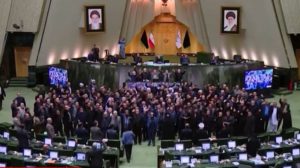
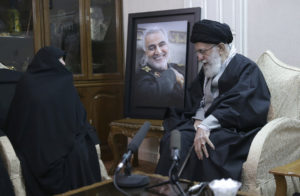
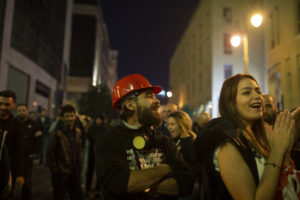
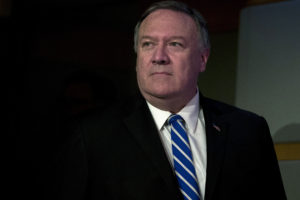


You need to be a supporter to comment.
There are currently no responses to this article.
Be the first to respond.